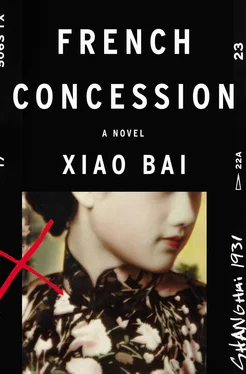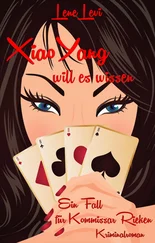3:32 A.M.

The dog howled. Leng looked at the clock on the dresser — it was only 3:30 A.M. Again she began to ask herself the questions that had tormented her for days.
Ts’ao Chen-wu, the man who had been killed at the wharf, was indeed her husband, but he was also her enemy. Her first husband had died at his hands. She didn’t know which fact trumped which.
A few months ago, she had come to Shanghai from Kweilin. At the time, Ts’ao was privately representing a senior figure in the Nanking government, a man active in the Kweilin army who was building a secret political coalition. If she had not run into Ko Ya-min that day, she might be in Paris by now. She had not seen him, but he had seen her. She was walking down Route Joffre to Route Ferguson, and he had followed her there. She was living in the Shanghai quarters of the Kweilin army, which had an armed police guard post outside. Military guards stood inside the gate, though they were unarmed because the Concession authorities did not permit firearms to be carried openly. He did not dare follow her inside.
The next time she ventured out, it was to a small bookstore on Route Gustave de Boissezon. He came up to her and stood behind her. They used to study Russian with the same tutor, the old Bolshevik. Even before turning around she knew that someone behind her was looking at her with hostility.
The Bolshevik was not old, but everyone called him that because of all the stories he told about his days in Moscow, St. Petersburg, Paris, about how he used to run circles around the policemen and spies. None of them had taken more than half a year of Russian classes, so he always spoke the simplest Russian in class. But every anecdote came to life as he recalled the expressions on people’s faces, the rustle of leaves falling to the ground, the color of a medicine bottle. He could turn the most ordinary things into the stuff of legends.
Wang Yang, her ex-husband, was a young tutor at the Russian school, just a few years older than she was. He had spent time in the Soviet Union, and he was lucky not to have been caught in the Peking University dormitories when the military police had burst in. He fled to the Soviet Union, and upon returning to Shanghai, he gave her and Ko tutorials. He was a gifted speaker, and a phrase in Russian or German would occasionally slip into his lectures. He used mimeographed copies of a textbook called Introduction to Marxism , which she later recognized as a translation from the Russian, of Bukharin’s The ABC of Communism.
Ko had always idolized Wang. That happened a lot — she had idolized Wang too, at least until they got married. Ko would do anything Wang asked him to do. In fact, he too had fallen in love with Leng, and he only kept his distance because he realized that Wang was already pursuing her.
Now Ko was gone too. He had chosen suicide, the highest form of sacrifice, the only one worthy of the word — choosing death rather than being killed.
The mission to assassinate Ts’ao should have been hers. She fought for it, but they had questioned her courage. It’s not that we don’t believe you’re capable of putting the revolution ahead of family ties, Ku had said. Family wasn’t the right word. But what would she have him say? After all, it was true that Ts’ao was her husband.
What she really wanted to say was, let me die with him. Sitting at the window of the apartment and looking out onto Rue Amiral Bayle, gazing at the dark outline of the city, she could hardly believe she was alive.
6. Be cruel to others and to yourself. All emotions, affections, friendship, romance, gratitude, even the love of honor, must be suppressed as forms of weakness, and replaced by the single-minded cruelty of revolutionary zeal.
She found this line in Ku’s manifesto for People’s Strength incomplete. It wasn’t friendship or love she had to suppress — it was self-loathing. If single-minded tyranny had the cleansing power Ku said it had, it should free her from self-hatred and despair.
“But when did he ask you to marry him?” Ko asked again.
I don’t know. I really don’t know. I was being held in a cell at Lunghwa Garrison Command. No watch, no woman in a green cheongsam to smile at me from a calendar, no sunlight. Sometimes a gust of wind would carry the smell of sun, grass, and fried stinky tofu into the corridor.
None of them responded. They were all quiet, even the boy in the white linen suit, who kept curling his bangs around his finger. Only later did she find out that his name was Lin. Ku too was silent. He became unusually hospitable, and kept offering her cups of water and tea. I’ve got Tiger Balm in case you have a headache, he said.
I just don’t know. Every morning, the wooden doors would open, and a slight breeze through the corridor would dispel the stench of an entire night’s sweaty bodies — who knew women could stink like that. Then an iron gate would open with a clink, and even though this sound promised the smell of sun and grass, it was terrifying. If you were to be interrogated, then you would still be alive; if not, you would be taken out to the prison yard and shot. They executed prisoners nearly every day. I had no news of Wang. The guards were gentle with us. “You aren’t bad people, you were just doing what you thought best for our country,” they said. But they were far from gentle with the other women, and if any of them were insubordinate they would be taken outside and savagely beaten up. I’d never have thought that women could be so cruel to other women. But they never told you anything, and the men were in a completely different wing of the prison. How could I possibly have had any news of Wang?
When she said this, Ko suddenly grew angry. She could tell that rage was welling up inside him. He stood before her, biting his fist, almost as if this were his way of declaring his love. If he wasn’t able to love her, he would have to hurt himself, and if he could not harm himself, he would hurt her—
His fist shot out and sprang back, testing, before he punched her hard on the forehead and cheekbone. Lin rushed up and held him back, but Ko’s eyes bulged as he struggled to free himself and pounce at her, like a sculpture of a man throwing himself at a pyre.
She felt humiliated. Not because Ko had hit her, but because Ku had said nothing. Actually, at that point she did not even know Ku’s name. All Ku had said was that he was gathering intelligence about her on behalf of the Party. He represented the Party. And the Party had stood by and said nothing while someone was punching her, or when she was arrested. That was humiliating. It showed that she was not important enough for the Party to bother rescuing her. She would have to rescue herself. The law student from the Communist Relief Society had said ambiguously: No, I do not represent the Party, but I am here on behalf of a Society, and I can offer you legal advice. You are free to take my advice as being from the Party, from your own cell. If Ts’ao asks something of you, you may acquiesce, he said, you may play along.
So she had played along, even though she felt despicable. Ts’ao arranged for the guards to give her exercise. He brought her food. He acted like a gentleman, and he didn’t ask her right away. They knew each other from growing up in the same small provincial capital, where they had been classmates at the teacher training college. Then they had left that suffocating inland city at the same time, both young people who craved revolution, except that one of them had gone to the south, and one had gone to Shanghai. The one in the south had joined the National Revolutionary Army, and now headed the Military Justice Unit belonging to the occupying troops. And she was his prisoner.
Читать дальше













